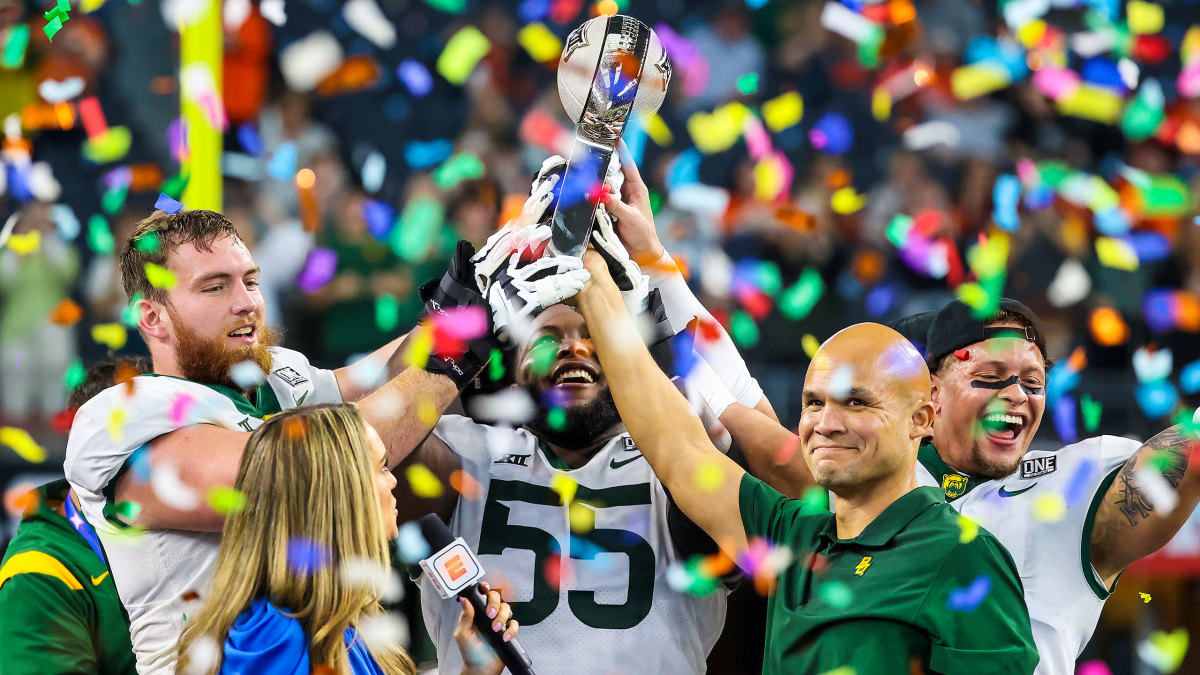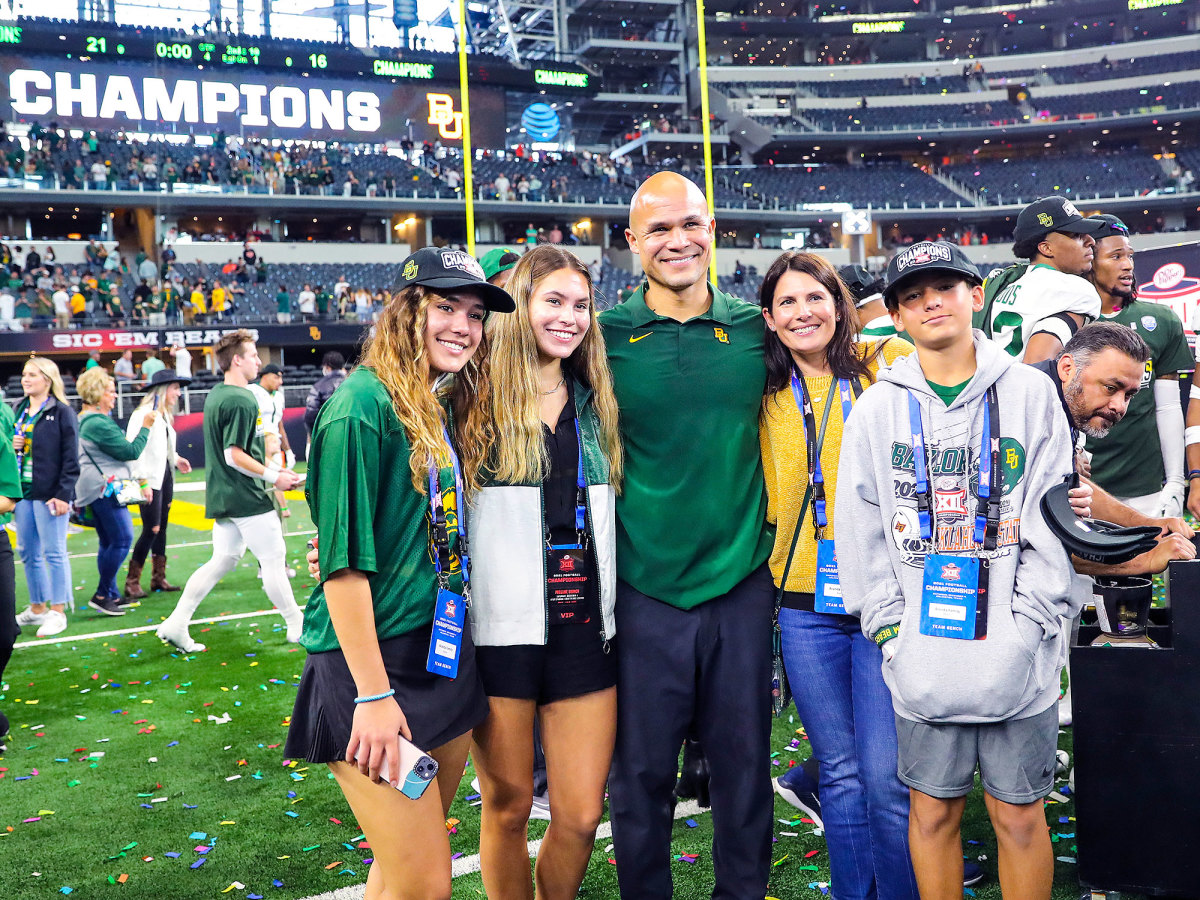Dave Aranda's Meteoric Rise Hits a New Peak With Baylor's Big 12 Title
ARLINGTON, Texas — Ten years ago, to the exact day, Dave Aranda got the most unsettling news: He’d lost his job.
On Dec. 4, 2011, Hawai'i forced coach Greg McMackin to resign and dismissed the entire staff, which included a little known defensive coordinator who had three children under the age of 6, a ticked-off wife and, for the most part, an empty bank account.
The previous year, with the family in such financial distress, the Arandas moved out of their small apartment and into an even tinier place: A school-controlled university housing unit meant for professors.
When you are fired, you are evicted.
“We had 30 days to get out,” Aranda recalls.
Every coach has a low point in their career, when they toy with thoughts of exiting the industry, when they question their ability. This was Dave Aranda’s. He remembers pacing around that apartment eating bowls of Ramen noodles and drinking pots of coffee each day because it was all he could afford. It was a sad sight, he says. “A bad deal.”
If that was the low point, exactly one decade later, Saturday is the high point: Aranda on a mobile stage situated on AT&T Stadium’s artificial turf, embracing the Big 12 championship trophy, his Baylor Bears celebrating a 21–16 win over Oklahoma State, a stunning 11–2 season in the 45-year-old's second year as head coach.

We sometimes get caught up in sports—yours truly included—writing about the touchdowns and the field goals, or the salaries and the facilities. We don’t spend enough time writing about the people that make this thing so great—the ones who rise from the bottom and get to the top.
Dave Aranda is one of those people. His meteoric rise—in the gutter 10 years ago and in the spotlight today—is what makes college football great. It’s what makes our country great, that a Mexican American who didn't grow up around money, fired and evicted a decade ago, can ascend to this position, as one of the most elite, highest-paid coaches in America.
The American dream? Sure. Call it what you want.
Dave Aranda is a shining example of it.
“It’s crazy,” he quietly says, a smile sweeping across his face before entering a celebratory locker room.
Aranda’s Bears played like a team led by a former squatty offensive guard and linebacker, a kid who never got the chance to really play college football because of his size and his surgeries (he had six of them on his shoulder).
The Cowboys (11–2) ran for just 70 yards, and although they managed to move the ball fairly well at times, they were stymied in the red zone. The Bears generated a pair of incredible goal-line stands to end the game.
First, with eight minutes left, they forced a field goal after stuffing the Cowboys on three snaps inside the one-yard line. On the final drive of the game, Oklahoma State took four cracks at the end zone from the two-yard line. It never got in.
On the last snap, with 30 seconds left in the game, OSU running back Dezmon Jackson ran wide toward the pylon for what looked like the winning score. Jackson dove toward the pylon, the ball outstretched as far as it could go while Baylor safety Jairon McVea shoved him out of bounds.
No touchdown.
On that final drive, Oklahoma State marched 89 yards on 17 plays. The Cowboys needed about six more inches.
McVea leaped off the turf and roared. Baylor players and staff members poured onto the field in a wild celebration with seconds still left on the clock. At the center of the party was their stoic, emotionless head coach, the calming presence in this utter mayhem. Television cameras showed him unmoved and stone-faced.
That’s Dave Aranda.
Let’s just cut to the point: Aranda is a weird guy as football coaches go. He’s a communicator and a thinker—not a yeller or a screamer. He’s a football nerd, a man who speaks about the “math of football” and babbles in technical jargon. An introvert with a nickname of “The Professor.”
Aranda once told this writer that he wishes he was more like the brash Star Wars character Han Solo. He wants to be the guy jumping up and down, running around like a mad man.
“Part of me wishes, at times, I could because I like seeing that stuff in movies, you know?” he said. “But I’ve never been like that.”
At some point during his first season at Baylor last year—a 2–7 campaign rife with COVID-19 outbreaks within the team—his players told the coach to, well, yell at them.
“You need to cuss us out,” they said.
Players trying to instill anger in their coach? A unique thing. A unique coach.
On Saturday, as he slowly walked off the field and into the tunnel, players mobbed him, screaming “I know you don’t like attention! I know you don’t like attention!”
#Baylor players leaped on Dave Aranda as he came off the field.
— Ross Dellenger (@RossDellenger) December 4, 2021
“I KNOW YOU DONT LIKE ATTENTION,” they screamed at him. pic.twitter.com/MzU1Fgf1F3
Does he like attention?
“No,” Aranda deadpanned.
What about in the locker room? Did you “cut loose” with your players?
“I did not,” he responded.
Outside of that celebratory locker room, Aranda smiled and calmly spoke. No real emotion. No excitement. Just words rolling out in a monotone.
He almost appeared generally annoyed with the coverage. Can you stop asking questions so I can scurry into a dark room and watch film, please?

His personality aside, Aranda is a brilliant mind, deemed by his colleagues as one of the smartest defensive coaches in the game. That bald noggin of his is filled with riddles that drive offensive coordinators batty.
Five years years ago, one of his old pals, Karl Scott, now the defensive backs coach for the Vikings, called Aranda “the smartest coach I’ve been around.”
“He’s going to be a rock star,” Scott said.
These days, Aranda is more rock than star. And that’s just the way he likes it.
Shine the spotlight somewhere else. Point your cameras elsewhere.
During his postgame news conference, Aranda was afforded the opportunity to make a pitch to the CFP selection committee. Should the Bears be considered for the playoff?
Instead of glowing about Baylor’s 11 wins, championship title and balanced units, he unnecessarily plunged himself into a discussion about its two losses. An unusual approach by an unusual coach—one that just 10 years ago found himself jobless, evicted and broke.
“It’s hard to be fired in Hawai'i,” Aranda said in an interview in 2016. “It’s probably the hardest place to get fired, the time change and all. I think people kind of forget you’re up there. I’ve never been one to work the phones or call. You’re basically kind of sitting around with no one calling.”
Aranda had just a couple of options—an assistant position at the FCS level to work under his current defensive coordinator Ron Roberts, or a return to his old high school as a high school coach.
And then, inside that tiny apartment, amid the smell of coffee and bowls of Ramen, in came his big break. Then-Utah State coach Gary Andersen, who he had connected with during Maui football camps, phoned the coach. He offered Aranda the job to be his defensive coordinator.
Every coach has his big break. That was Dave Aranda’s.
And now, a decade after arriving at the lowest point in his career, he’s hit the high.
More College Football Coverage:
• There's Little to Debate About This Playoff Field
• One Inch Decided The Big 12 Championship Game
